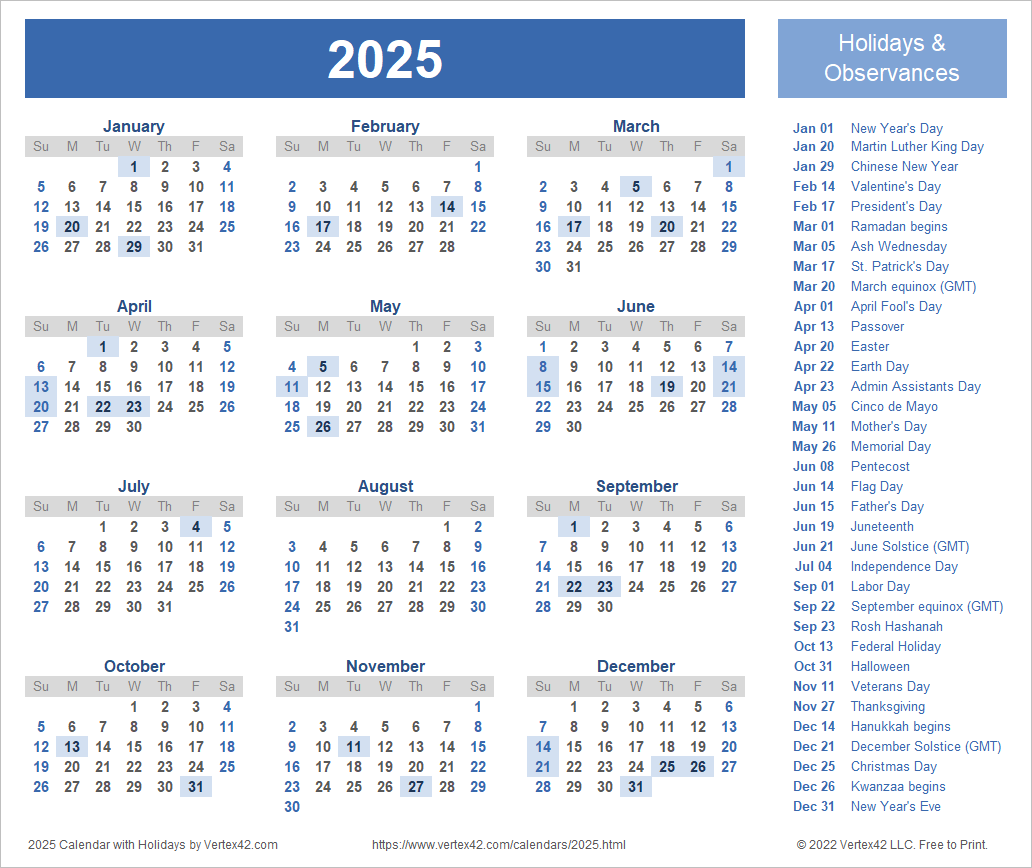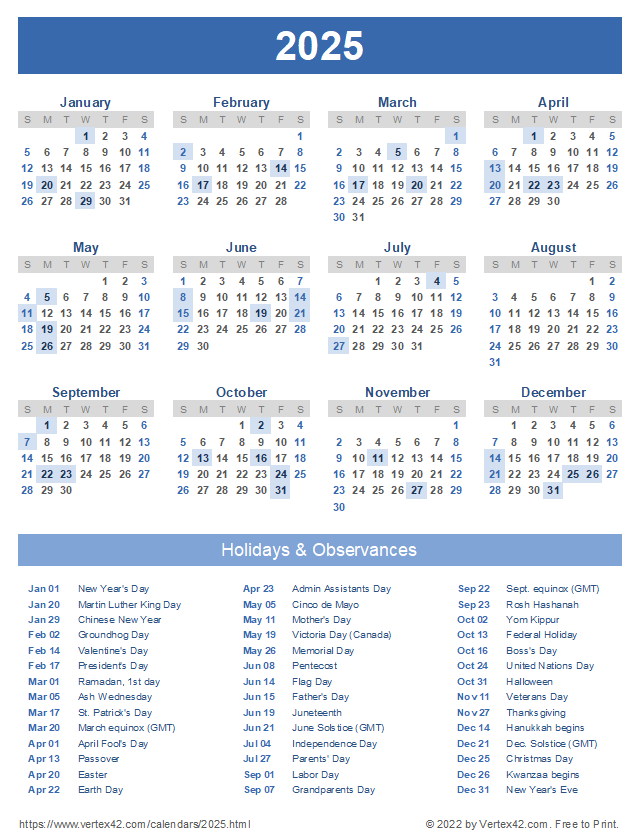2025 Calendar: A Comprehensive Guide To Holidays And Observances
2025 Calendar: A Comprehensive Guide to Holidays and Observances
Related Articles: 2025 Calendar: A Comprehensive Guide to Holidays and Observances
- 2025 Calendar Of Dates
- March 2025 Gujarati Calendar: A Comprehensive Guide
- Calendario 2025 Julio Imprimir: Planifique Y Organice Su Mes Con Estilo
- Cheap Holiday 2025 Calendar: Plan Your Budget-Friendly Getaways
- 2025 Calendar At A Glance: A Comprehensive Overview
Introduction
With enthusiasm, let’s navigate through the intriguing topic related to 2025 Calendar: A Comprehensive Guide to Holidays and Observances. Let’s weave interesting information and offer fresh perspectives to the readers.
Table of Content
Video about 2025 Calendar: A Comprehensive Guide to Holidays and Observances
2025 Calendar: A Comprehensive Guide to Holidays and Observances

The year 2025 promises to be a year filled with significant holidays, observances, and cultural events. From traditional religious festivals to national commemorations and international days of recognition, there is a diverse array of holidays to mark on your calendar. This comprehensive guide will provide you with an overview of the major holidays and observances in 2025, helping you plan your year accordingly.
January
- New Year’s Day (January 1st): The first day of the year, marking the beginning of the Gregorian calendar.
- Epiphany (January 6th): A Christian feast day commemorating the visit of the Magi to the infant Jesus.
- Martin Luther King Jr. Day (January 20th): A federal holiday in the United States honoring the civil rights leader.
- Australia Day (January 26th): A national holiday in Australia celebrating the arrival of the First Fleet in Sydney Cove in 1788.
February
- Groundhog Day (February 2nd): A traditional holiday in the United States and Canada, where a groundhog’s behavior is used to predict the arrival of spring.
- Valentine’s Day (February 14th): A day dedicated to love and romance, celebrated worldwide.
- Presidents’ Day (February 17th): A federal holiday in the United States honoring the birthdays of George Washington and Abraham Lincoln.
- Shrove Tuesday (February 25th): The day before Ash Wednesday, marked by festivities and the consumption of pancakes.
March
- Ash Wednesday (March 5th): The first day of Lent, a period of fasting and penance in the Christian calendar.
- International Women’s Day (March 8th): A global day dedicated to celebrating the achievements of women and promoting gender equality.
- St. Patrick’s Day (March 17th): A cultural and religious holiday honoring the patron saint of Ireland, celebrated with parades, festivals, and the wearing of green.
- Nowruz (March 20th): The Persian New Year, celebrated in Iran and other countries in the region.
April
- April Fools’ Day (April 1st): A day of pranks and practical jokes.
- Easter Sunday (April 13th): The Christian holiday commemorating the resurrection of Jesus Christ.
- Earth Day (April 22nd): A global event dedicated to raising awareness about environmental issues.
- ANZAC Day (April 25th): A national holiday in Australia and New Zealand commemorating the Australian and New Zealand Army Corps (ANZAC) who served in World War I.
May
- May Day (May 1st): A labor holiday celebrated in many countries, often with parades and demonstrations.
- Cinco de Mayo (May 5th): A Mexican holiday commemorating the Battle of Puebla in 1862.
- Mother’s Day (May 11th): A day dedicated to celebrating mothers and motherhood.
- Memorial Day (May 26th): A federal holiday in the United States honoring the men and women who have died while serving in the military.
June
- Father’s Day (June 15th): A day dedicated to celebrating fathers and fatherhood.
- Juneteenth (June 19th): A federal holiday in the United States commemorating the emancipation of enslaved African Americans.
- Summer Solstice (June 21st): The longest day of the year in the Northern Hemisphere, marking the beginning of summer.
July
- Independence Day (July 4th): A federal holiday in the United States celebrating the signing of the Declaration of Independence in 1776.
- Canada Day (July 1st): A national holiday in Canada commemorating the enactment of the Constitution Act in 1867.
- Bastille Day (July 14th): A national holiday in France commemorating the storming of the Bastille in 1789.
August
- Eid al-Fitr (August 3rd-4th): A Muslim holiday marking the end of the fasting month of Ramadan.
- International Youth Day (August 12th): A global day dedicated to celebrating and empowering youth.
- Assumption of Mary (August 15th): A Christian feast day commemorating the belief that the Virgin Mary was taken up into heaven.
September
- Labor Day (September 1st): A federal holiday in the United States celebrating the contributions of workers.
- Rosh Hashanah (September 29th): The Jewish New Year.
October
- Columbus Day (October 13th): A federal holiday in the United States commemorating the arrival of Christopher Columbus in the Americas in 1492.
- Halloween (October 31st): A cultural holiday celebrated with costumes, trick-or-treating, and other festivities.
November
- All Saints’ Day (November 1st): A Christian feast day honoring all Christian saints.
- Remembrance Day (November 11th): A day of remembrance for those who have served and died in war.
- Thanksgiving (November 27th): A federal holiday in the United States and Canada, celebrating family, gratitude, and the harvest.
December
- Hanukkah (December 10th-18th): A Jewish holiday commemorating the victory of the Maccabees over the Seleucid Empire.
- Christmas (December 25th): A Christian holiday celebrating the birth of Jesus Christ.
- Boxing Day (December 26th): A holiday celebrated in many countries, traditionally a day for giving gifts and spending time with family.
- New Year’s Eve (December 31st): The last day of the year, marked by celebrations and anticipation for the coming year.
Additional Observances
In addition to the major holidays listed above, there are numerous other observances and awareness days throughout the year. These include:
- World Cancer Day (February 4th)
- International Day of Women and Girls in Science (February 11th)
- World Down Syndrome Day (March 21st)
- Autism Awareness Month (April)
- Pride Month (June)
- International Day of Peace (September 21st)
- World Mental Health Day (October 10th)
- International Day of Persons with Disabilities (December 3rd)
Tips for Planning Your Calendar
To effectively plan your calendar for 2025, consider the following tips:
- Mark important dates: Write down all the major holidays, observances, and any other significant dates that you need to remember.
- Use a color-coded system: Assign different colors to different types of events, such as holidays, work-related events, and personal appointments.
- Set reminders: Set reminders for important events, especially those that require preparation or travel.
- Be flexible: Things don’t always go according to plan, so be prepared to adjust your calendar as needed.
- Take breaks: Schedule regular breaks throughout the year to avoid burnout and maintain a healthy work-life balance.
By following these tips, you can create a comprehensive calendar that will help you stay organized and on top of your commitments throughout the year 2025.








Closure
Thus, we hope this article has provided valuable insights into 2025 Calendar: A Comprehensive Guide to Holidays and Observances. We hope you find this article informative and beneficial. See you in our next article!